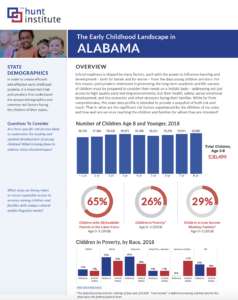

January 27, 2020
In the world of public policy, data plays an essential role. For policymakers interested in advancing the needs of young children in their states, it is important that the data at their fingertips reflect the full complexity of the issues at hand – combining child demographic and risk data with information on early childhood program access, quality, and cost. Reliably pulling this data together is a tall order, for sure, which may be why many available sources limit their reporting to more isolated areas of focus.
 In an effort to meet this need and provide elected leaders with the most comprehensive profiles available, The Hunt Institute compiled and published its first set of State Early Childhood Data Narratives in 2018. Today, we’re excited to share new and expanded profiles for all 50 states and the District of Columbia. These include the most current data available and expand on issues of equity and public investment.
In an effort to meet this need and provide elected leaders with the most comprehensive profiles available, The Hunt Institute compiled and published its first set of State Early Childhood Data Narratives in 2018. Today, we’re excited to share new and expanded profiles for all 50 states and the District of Columbia. These include the most current data available and expand on issues of equity and public investment.
The 2020 State Early Childhood Data Narratives include carefully curated data reflecting:
For 2020, we are especially pleased to include expanded data estimating both access by – and federal expenditures on – infants and toddlers within the Child Care and Development Fund and Early Head Start. Not routinely reported in isolation from larger federal program totals, this data was calculated by The Hunt Institute for this report using other publicly available data in collaboration and consultation with Louise Stoney of the Alliance for Early Childhood Finance.
Learn more about these data narratives during The Hunt Institute’s Intersection Webinar on February, 12, 2020. You can register for this webinar here.
We hope you find these profiles helpful to your work and welcome your feedback on how next year’s edition can best meet your needs.
Special thanks to The Hunt Institute interns Charles Hinton and Hannah Gahagan for their assistance on data collection.
Author

Dan Wuori, Ph.D.
Director of Early Learning
The Hunt Institute